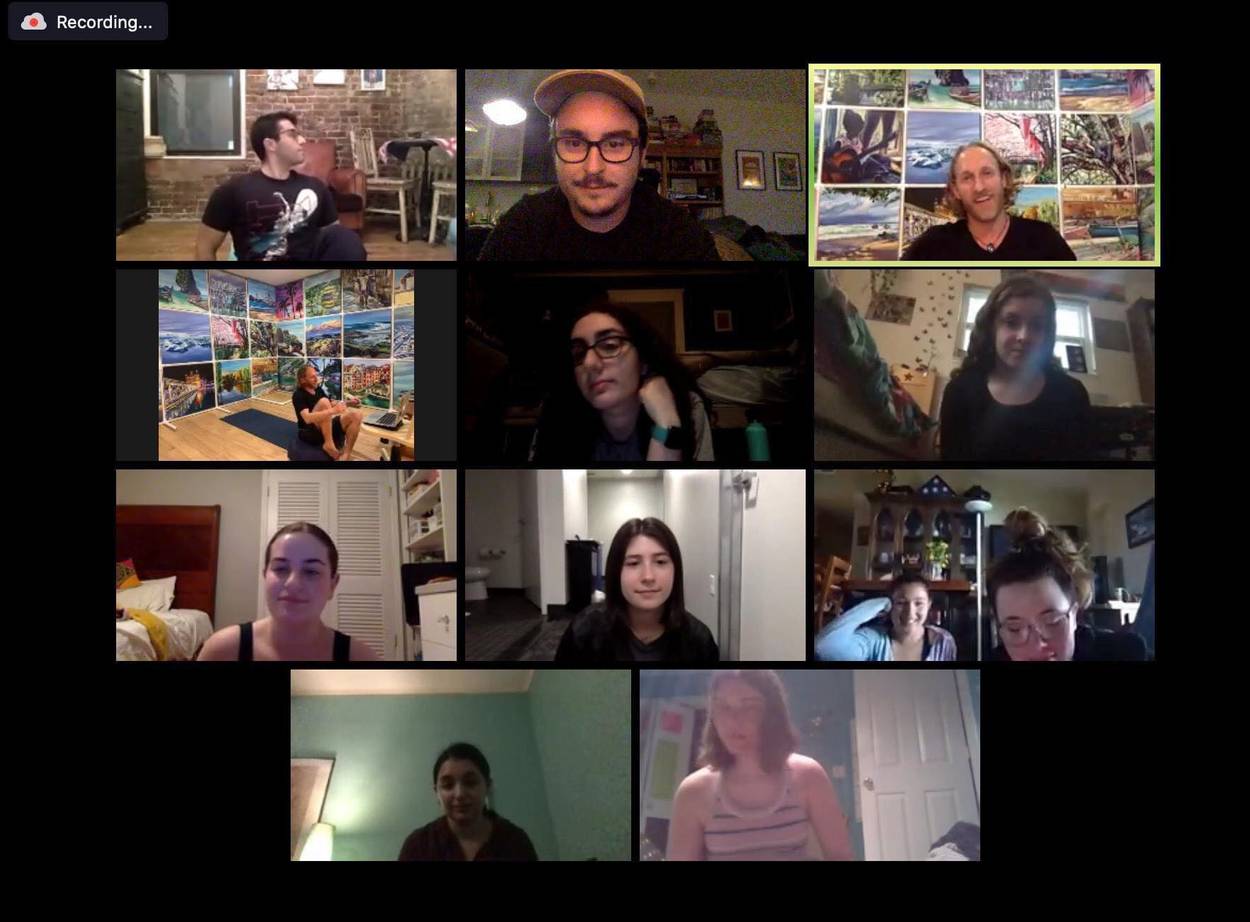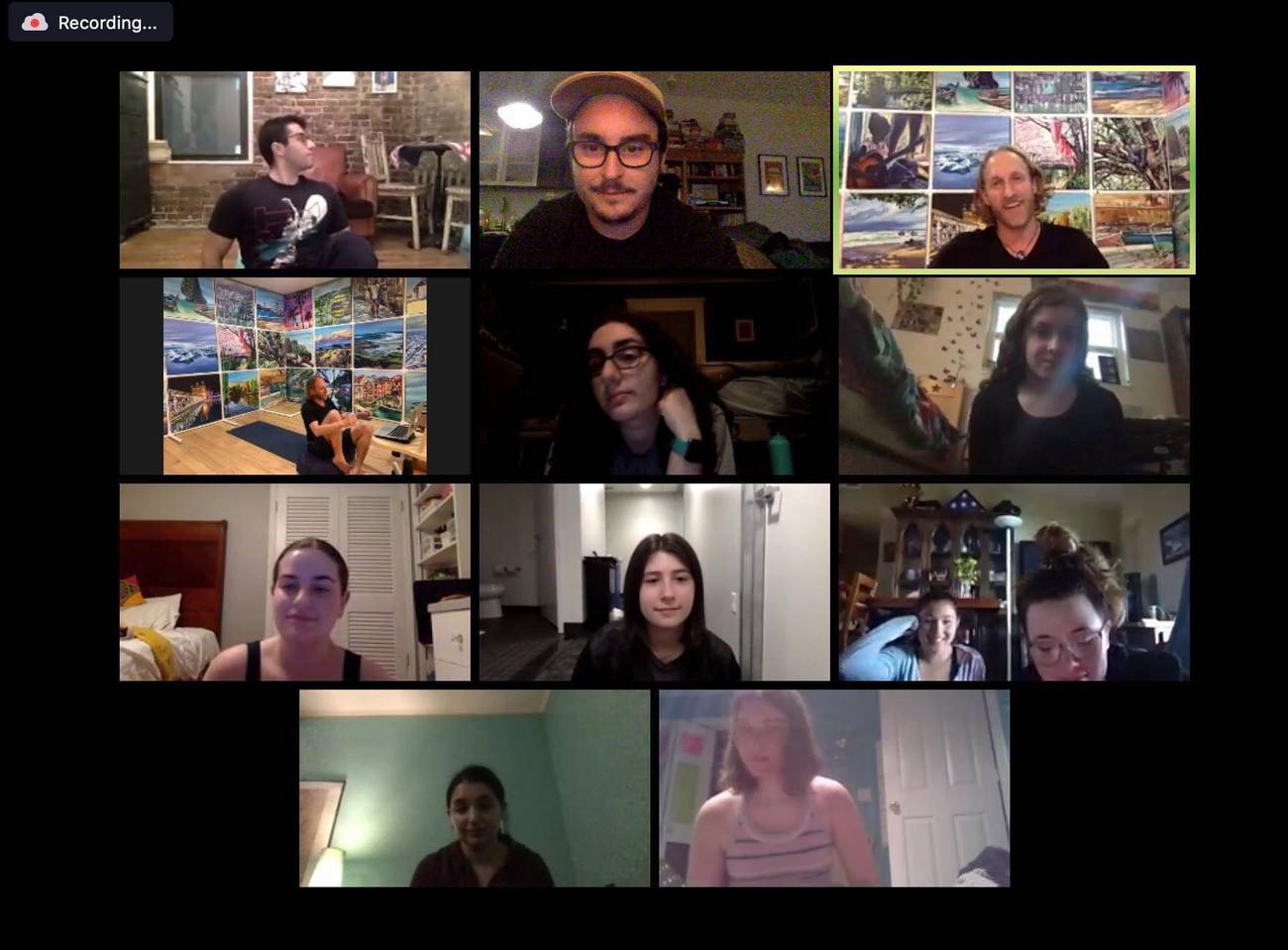Their Campuses Closed, Jewish Students Find Each Other Online
New virtual communities keep people connected—by sharing recipes, offering personal support, and making romantic matches




When Clark University told its students in late March that they’d be finishing the remainder of their semester online because of the COVID-19 pandemic, junior Ari Hoffman—ClarkU Hillel’s treasurer—wondered how he would make up for the Jewish community he would be leaving when the campus in Worcester, Massachusetts, closed. He took to Facebook to ask if any other students were feeling this loss.
“When I posted, it was the day after classes were canceled,” Hoffman told me. “I was making my way home, leaving campus and was thinking, ‘What could I still do when I was home?’”
Hoffman received a flood of replies to his Facebook post—students expressing their need for a space to connect with other Jewish students. Within days, he and a couple of his friends founded the Zoom University Hillel Facebook group.
Clark University junior Monica Sager, who served as ClarkU Hillel’s president last year, said that the idea of creating a virtual Hillel community started as a joke. However, in a matter of days she joined Hoffman as the page’s first moderator to help manage the community that was rapidly growing.
The Facebook group does not have traditional Hillel leadership structures, but has a total of 16 moderators and admins who help with the behind-the-scenes logistics of the group.
“We approve posts, delete any comments or anything that does not go along with our three-rule guideline,” Sager said. Those guidelines: no political debates, no bullying or shaming, and no self-promoting.
Anna Huggett posted TikTok dances choreographed to Passover songs. Shifra Lindenberg posted that she is hosting Zoom Speed Dating sessions. Some members even asked for assistance with grocery shopping for their grandparents and received handfuls of comments from members eagerly offering help.
“ClarkU Hillel has been an integral part of my college career, and it was a place where I met a lot of my close friends,” Sager said. “This group has the same kind of effect. People have a community, even if it spans worldwide. They are able to have some fun and take their mind off of the virus even just for a little bit.”
Hoffman said that while the Facebook page’s members were initially all Clark University students, students around the country started joining by the thousands through word of mouth. The Facebook group had 10,000 followers in its first week, and now has 14,000 members creating and engaging with a mix of content from Jews, and non-Jews, of all denominations from a wide range of cultural, regional, and social backgrounds.
“Anyone is still welcomed into the group,” said Sager. “We never wanted this to be a group just for Clark students or just for Jews even.”
Madeline Olliff, a graduate student at Georgia College & State University, first heard about the page through a group message she had with other Hillel students from her school. Olliff is a year into her conversion process to Judaism. She said that being part of a Jewish community has been the biggest help throughout the process, and she feared she would lose it once school closed down. However, when Olliff took to the Facebook group to express her fears and ask for Passover recipe recommendations, she was greeted with nearly 500 likes and over 100 comments.
“So many people were supportive, so nice and so loving—it kind of blew me away,” said Olliff. “Someone even sent me a screenshot of a secret family recipe that I can’t share with anyone else.”
The Facebook group gives students the chance to find other Jews with whom they share specific interests. The group is flooded with posts of people saying “Where are my Jews that are ____?” with blanks filled with descriptors like “field-goal kickers” to “above 6 feet” and “song leaders from summer camp.”
These similar interest posts sometimes sprout into spinoff groups where members form communities of their own, including a group for LGBTQ+ students, a Middle Eastern debate club, and a Zoom University Chabad Facebook group.
Jordan Cope, founder of the Zoom University Chabad Facebook group and law student at the University of Texas at Austin, hoped to create a more intimate community that could resemble the Chabad community he belonged to at school. He said that he hoped the group would be a more intimate space for people looking to celebrate Judaism rather than mainstream Jewish culture.
Cope said that for the majority of his life, he felt disconnected from the Jewish community. He said growing up, Jewish day school felt like a chore and that the groups he encountered had a problem with materialism and cliquishness, and he believed didn’t adequately reflect the Jewish community.
Cope said he made the Chabad University Facebook group because he wanted other students to feel the same connection he did while on campus—a connection he feared they might miss out on now that schools were closed. “We’re no longer focusing on life in a convenient space. It’s amazing in the sense that a lot of genuine people are being connected to other genuine people throughout the country, forging strong relationships that are founded on mutual interests and founded on personality as opposed to just the convenience of the situation and the circumstances that exist,” said Cope.
Aaron Raimi, a San Diego State University student, saw the popularity of the Zoom University Hillel Facebook group and thought, “Someone should make a group like this, but for dating.” So he created MeetJew, a Facebook group for single Jewish students to meet each other.
MeetJew is flooded with Craigslist-type advertisements featuring Jewish students seeking potential suitors in light of the restrictions on socializing because of the ongoing pandemic; the page currently has 37,000 followers. Raimi hoped the group would give people a chance to find a romantic partner—or as he coined it, #CoronaCutie—during this time of isolation.
“By completely eliminating the physical aspect of dating that is so popular nowadays with hookup culture, I think people have the chance to actually get to know each other,” Raimi said. “We are forced to build up that foundation of a relationship by really getting to know someone, even if it’s through FaceTime.”
Julia Wolf, a University of Oregon student, said that although she checks the Zoom University Hillel Facebook page less frequently, she does check MeetJew regularly. “There is some tiny part of me that hopes that maybe someone will show up on the feed who might be my soul mate,” Wolf said.
While some students are exploring the new world of virtual relationships, Temple University student Valerie Levy is not new to making friendships online. She said she met her best friend through a Facebook group during her freshman year of college and serves as proof that virtual friendship can transition into the physical world. “People were using Facebook groups actively before the quarantine,” Levy said. “I think after the quarantine, people are still going to be using it. They’re going to create a relationship with these groups, and have an emotional connection with them so they’re not going to want to leave that.”
As for the man who inspired it all, Hoffman said that the future of the Zoom University Hillel Facebook page is in the hands of the people who invest in it.
“This whole thing was made by the people who have been involved, so it depends on how everyone else feels,” said Hoffman. “I wouldn’t push it, but I would love to keep it if people were interested.”
Romi Geller is a journalism student at the University of Texas at Austin.